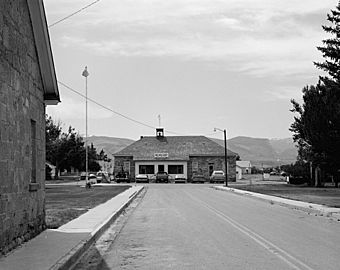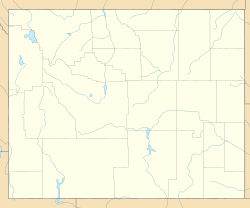Fort Washakie facts for kids
Quick facts for kids |
|
|
Fort Washakie Historic District
|
|

Fort Washakie Building #1
|
|
| Nearest city | Fort Washakie, Wyoming |
|---|---|
| Area | 23 acres (9.3 ha) |
| Built | 1869 |
| NRHP reference No. | 69000188 |
| Added to NRHP | April 16, 1969 |
Fort Washakie was an important U.S. Army fort located in what is now the state of Wyoming. It was first built in 1869. This fort has a unique history, including being named after a famous Native American leader. It played a key role in the region for many years.
Contents
What Was Fort Washakie?
Fort Washakie was a military base established by the U.S. Army. It was set up in 1869 in the area that would later become the state of Wyoming. The fort's main purpose was to help keep peace and manage relations in the region.
How Fort Washakie Got Its Name
The fort went through a few name changes before it became Fort Washakie. Each name honored a different important person.
From Camp Augur to Camp Brown
When the fort was first built in 1869, it was called Camp Augur. This name honored General Christopher C. Augur. He was a commander in the U.S. Army's Department of the Platte.
In 1870, the camp's name was changed again. It became Camp Brown. This new name was in honor of Captain Frederick H. Brown. Captain Brown had died in a battle called the Fetterman Massacre in 1866.
Honoring Chief Washakie
The fort received its final name in 1878. It was renamed Fort Washakie. This was done to honor Chief Washakie of the Shoshone tribe. This made Fort Washakie one of the very few U.S. military forts named after a Native American leader. Another example was Fort E.S. Parker in Montana. It was named after Eli Parker, a Seneca lawyer and general.
The Fort's Later Years
Fort Washakie operated as a military base for many years. It served the U.S. Army until 1909. At that time, the fort was officially closed down. After its closing, the land and buildings were given to the Shoshone Indian Agency.
Today, the site of Fort Washakie is part of the Wind River Indian Reservation. Two very important historical figures are buried on the fort's grounds. These include Chief Washakie himself and Lewis and Clark Expedition guide Sacajawea.
 | Percy Lavon Julian |
 | Katherine Johnson |
 | George Washington Carver |
 | Annie Easley |



